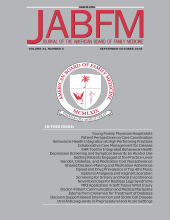Abstract
Purpose: To understand attitudes that may affect health care workers’ ability to provide appropriate long-term care for patients who stay with abusive partners.
Methods: We surveyed 278 health care workers in 31 primary care practices before their participation in an educational intervention.
Results: More than half of participants (51% to 60%) found it easy to empathize with a patient who decided to remain in an abusive relationship if the patient was described as poor or disabled, but few (25% to 39%) could empathize if the patient was described as educated or financially secure. A majority (57% to 59%) agreed with a statement meant to assess unrealistic expectations. (“A provider’s responsibility includes making sure a patient gets to a shelter right away if he or she discloses abuse.”) Participants who agreed with this statement had more difficulty empathizing with patients who decided to stay with an abusive partner (P = .0045).
Conclusions: Training efforts must focus on screening and on helping providers develop more realistic expectations about the complex nature of leaving an abusive relationship. Health care workers need a better understanding of the barriers patients face and why patients may choose to remain in abusive relationships, even in the absence of economic or health limitations.







